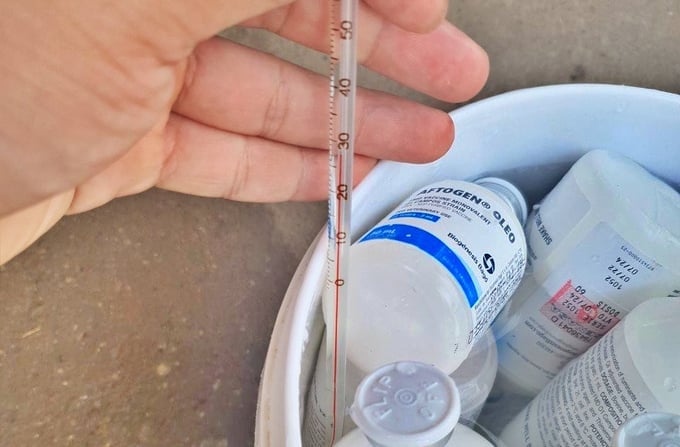June 21, 2025 | 01:12 GMT +7
June 21, 2025 | 01:12 GMT +7
Hotline: 0913.378.918
June 21, 2025 | 01:12 GMT +7
Hotline: 0913.378.918

According to Associate Professor Dr. Nguyen Van Giap, Faculty of Veterinary Medicine under Vietnam National University of Agriculture, there have been significant changes in the official documentation of vaccine efficacy over the years. Photo: PT.
Drawing from the global experience in the fight against foot-and-mouth disease (FMD), Associate Professor Dr. Nguyen Van Giap, Faculty of Veterinary Medicine under Vietnam National University of Agriculture, emphasized that prioritizing the selection of suitable vaccine quality is a paramount factor in the National Program for FMD Prevention and Control.
Additionally, countries and territories which have successfully eradicated the foot-and-mouth disease should still maintain a vaccine stockpile to be prepared for emergencies and disease prevention.
Lessons from global disease control efforts highlighted that vaccines and their quality are the most crucial keys in disease prevention.
Regarding the role of vaccines in the fight against foot-and-mouth disease, Dr. Nguyen Van Giap analyzed that official documentation prior to the early 2000s did not focus on antigen content. However, governmental documents in the last few years have placed a growing emphasis on the high 6PD50 antigen content.
"The reason for this change is that, in the past, the efficacy of vaccines was recognized based on the compatibility of the vaccine strain with the local virus strain. Although Vietnam contained multiple virus strains which are different from the vaccine strain, the vaccines were effective in the protection due to the high 6PD50 antigen content, which can broaden cross-protection against different virus strains within the same serotype," explains Mr. Giap.
According to Dr. Giap, the quality of a vaccine can be analyzed from various aspects such as adjuvants, purity control processes, etc. However, the choice of strains and the increasing antigen levels in each vaccine dose are critical components.
Companies providing foot-and-mouth disease vaccines regularly conduct real efficacy tests against circulating virus strains and publish results every three months. This serves as the basis for farmers to choose effective vaccines, and manufacturers to improve their products in response to practical needs.

Foot-and-mouth disease vaccines with a high 6PD50 antigen content are currently prioritized for use in disease prevention and control by local authorities, businesses, and the veterinary industry. Photo: PT.
According to Dr. Nguyen Van Giap, Vietnam has established numerous regulations for the prevention of foot-and-mouth disease; however, the level of compliance among farmers is also a significant issue for achieving positive outcomes.
Dr. Giap emphasized that the National Program for FMD Prevention and Control from 2021 to 2025 holds significant importance in Vietnam's determination to eradicate the disease and protect livestock herds nationwide.
Regarding the significance of the program after three years of implementation, Dr. Nguyen Van Giap assessed that Vietnam is rapidly reinforcing its connection with many countries around the world. Consequently, Vietnam must approach international standards in the field of disease prevention, with a focus on Foot-and-mouth disease, which poses a high level of danger.
The transportation of animals and animal products from a country suffering from FMD to countries without the disease is strictly prohibited. As a result, Vietnam must focus on building safe and disease-free production areas to develop a safe livestock industry and create broad outlets for products.
According to Mr. Giap, the livestock production industry in Vietnam is developing in an industrial direction, with fewer farms but an increasing number of livestock. If an FMD outbreak occurs within an expansive livestock farm, the disease is capable of causing widespread and significant damage.
In this regard, the Government's National Disease Prevention Program has an indispensable role in protecting the domestic livestock industry.
"Vietnam has both advantages and challenges in the prevention of diseases. Its biggest challenge lies in the inability to strictly control smuggled products through unofficial channels. This is an aspect that the National Disease Prevention Program needs to promptly address," Dr. Nguyen Van Giap recommended.
Nevertheless, Mr. Giap believes that the implementation of vaccines and the selection of highly effective vaccine types are being executed efficiently.
"After animals recover from the foot-and-mouth disease, they will continue to carry and spread the virus. As a result, I would like to advise farmers to comply with isolation procedures, avoid transporting animals or animal products from the affected areas to prevent the emergence of new outbreak areas," Associate Professor Dr. Nguyen Van Giap advised livestock farmers on the prevention of foot-and-mouth disease.
Translated by Nguyen Hai Long
![Turning wind and rain into action: [9] Digitizing hydrometeorological data in response to climate change](https://t.ex-cdn.com/nongnghiepmoitruong.vn/608w/files/news/2025/06/17/z6704423696987_15fd32ffc26d590d204d520c9dac6786-nongnghiep-165943.jpg)
(VAN) Farmers have begun accessing hydrometeorological applications to adjust their cropping schedules, aiming to ensure productivity and adapt to climate change.
![Turning wind and rain into action: [8] Real-time salinity detection and early warning technology](https://t.ex-cdn.com/nongnghiepmoitruong.vn/608w/files/news/2025/06/17/z6704423696987_15fd32ffc26d590d204d520c9dac6786-nongnghiep-151127.jpg)
(VAN) Thanks to the integration of modern hydrological-hydraulic models, remote sensing technologies, and artificial intelligence, the accuracy of hydrological forecasting has significantly improved.
![Turning wind and rain into action: [7] Early disaster warnings help marine farmers minimize losses](https://t.ex-cdn.com/nongnghiepmoitruong.vn/608w/files/news/2025/06/17/z6704423696987_15fd32ffc26d590d204d520c9dac6786-nongnghiep-142942.jpg)
(VAN) In recent years, thanks to early disaster warnings and forecasting, marine farmers in Khanh Hoa province have been able to reduce risks and losses, thereby improving production efficiency.
![Turning wind and rain into action: [6] ‘Four on-the-spot’ disaster management software](https://t.ex-cdn.com/nongnghiepmoitruong.vn/608w/files/news/2025/06/17/e5a48259d6a262fc3bb3-nongnghiep-183800.jpg)
(VAN) By simply activating the scenario on the disaster management software, the relevant authorities immediately know how many households need to be evacuated, where to evacuate them to, and by what means of transportation…
![Turning wind and rain into action: [5] Hue applies modern technology in disaster forecasting](https://t.ex-cdn.com/nongnghiepmoitruong.vn/608w/files/news/2025/06/17/z6704423696987_15fd32ffc26d590d204d520c9dac6786-nongnghiep-093938.jpg)
(VAN) In Hue city, modern technology has recently been applied in meteorological and hydrological forecasting and warning, helping to reduce the damage caused by natural disasters.

(VAN) A cutting-edge farming technique being implemented on an experimental ranch in Arizona's Sonoran Desert has already saved a billion gallons of water over five years, according to Civil Eats.

(VAN) Poultry and pig production and the environment can be boosted through enhanced water technology, according to new research.